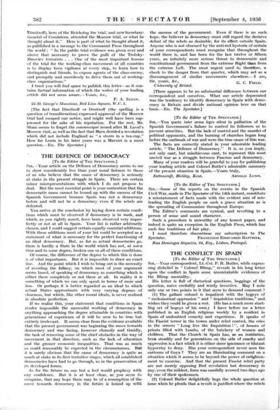THE DEFENCE. OF DEMOCRACY
[To the Editor of THE SPECTATOR.] SIR,—Your article on the Defence of Democracy seems to me to show considerably less than yonr usual fairness to those of us who believe that the cause of democracy is seriously at stake in the present struggle in Spain. There are certain minor misrepresentations with which I do not propose to deal. But the most essential point is your contention that the democratic cause cannot be bound up with the success of the Spanish Government because Spain was not a democracy before and will not be a democracy even if the rebels are defeated.
You arrive at the conclusion by laying down certain condi- tions which must be observed if democracy is to work, and which, as you rightly assert, have been observed very imper- fectly or not at all in Spain. Your list is rather arbitrarily chosen, and I could suggest certain equally essential additions. With these additions most of your list could be accepted as a statement of what is necessary for the perfect functioning of an ideal democracy. But, as far as actual democracies go, there is hardly a State in the world which has not, at some time and to some degree, broken one or all of these conditions.
Of course, the difference of the degree to which this is done is of vital importance. But it is impossible to draw an exact line. And the point which I wish to bring out is the necessity of avoiding the fallacy, on which most of your argument seems based, of speaking of democracy as something which is either there completely or not there at all. In reality it is something of which we can only speak in terms of more and less. Or perhaps it is better regarded as an ideal to which actual States approximate with very varying degrees of closeness, but which, like other moral ideals, is never realised in absolute perfection. •
If we realise this, your statement that conditions in Spain render impossible the successful working of democracy in. anything approaching the degree attainable in countries with generations of experience of it will be seen to be true but entirely irrelevant. It seems clear from the evidence available that the present government was beginning the move towards democracy and was facing, however clumsily and timidly, the task of removing some of the chief obstacles in the way of movement in that direction, such as the lack of education and the grosser economic inequalities. That was fts much as could reasonably be expected in the circumstances. But it is surely obvious that the cause of democracy is quite as, much at stake in its first tentative stages, which all established democracies have had to go through, as in the preservation of
its developed forms. .
As for the future no one but a fool would prophesy with any confidence. But it is at least clear, as, you .seem to recognise, that any hope there may be of a resumption of the move towards democracy in the futiiie is Wand up -vkith the success of the government. Even if there is no such- hope, the believer in democracy must still regard the decisive defeat of the rebels -as desirable, for its effect outside Spain. Anyone who is not obsessed by the anti-red hysteria of certain of your correspondents must recognise that throughout the world there is, and has been for the last twelve or fifteen years, an infinitely more serious threat to democratic and constitutional government from the extreme Right than from the extreme Left. The most urgent need is; themidore, a check to the danger from that quarter, which may act as a discouragement of similar movements elsewhere. —I am, [There appears to be no substantial difference between our correspcindent and ourselves. What our article deprecated was the tendency to identify democracy in-Spain with demo- cracy in Britain and divide national opinion here on that basis.—En. The Spectator.]






































 Previous page
Previous page